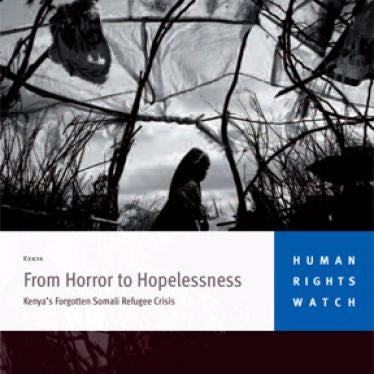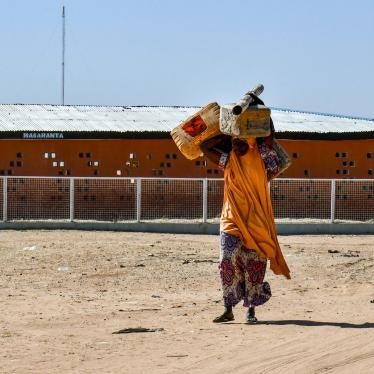(Nairobi) - Kenya should immediately stop deporting Somali asylum seekers, including women and children, back to their war-torn country, Human Rights Watch said today. The group said that Kenya should recognize all Somalis who qualify as refugees with rights to protection in Kenya.
On March 23, 2009, the Kenyan military intercepted a bus with 61 Somali asylum seekers, took them to a police station in the northeastern town of Dadaab, and then forced them back into Somalia. On March 31, the police expelled another busload with 31 asylum seekers. Those forced back into Somalia included 33 women and 28 children.
"Deporting asylum seekers, including women and children, who are trying to escape appalling violence in their country puts Kenya to shame," said Gerry Simpson, refugees researcher at Human Rights Watch. "The police publicly proclaimed on March 30 that Kenya treats all refugees with ‘due care and dignity,' and the very next day sent another 31 of them back into a war zone."
The deportations, in violation of both Kenyan and international law, are the most recent in a string of similar incidents since January 2007, when Kenya officially closed its border with Somalia and forced the closure of a refugee transit center where the Office of the United Nations High Commissioner for Refugees (UNHCR) had registered new refugees as soon as they entered Kenya. In the two most recent cases, the Kenyan authorities denied the refugee agency access to the asylum seekers, claiming that the police and the military have instructions to return asylum seekers to Somalia. UNHCR says that government officials confirmed both incidents.
On March 30, Human Rights Watch released a report, "From Horror to Hopelessness: Kenya's Forgotten Somali Refugee Crisis," describing conditions for the Somalis in the overcrowded refugee camps near Daadab and documenting dozens of cases of forced return of Somali asylum seekers and refugees from the border areas. In one case, on January 16, police shot at vehicles carrying asylum seekers and then entered a hospital where three of them were receiving treatment for gunshot wounds, drove them back to the border, and dumped them back into Somalia.
Under Kenyan law, asylum seekers escaping violence in Somalia are entitled to request the government or UNHCR to recognize them as refugees, either in refugee camps or in Nairobi. Many foreign governments and aid agencies work in the refugee camps to assist those fleeing the violence in Somalia. Human Rights Watch said donors should press Kenya to respect the rights of refugees.
The deportations also violate the most fundamental principle of refugee law, the prohibition on refoulement - the forcible return to a place where a person faces a threat to life or freedom on account of race, religion, nationality, membership of a particular social group, or political opinion. Under the 1969 African Union Convention Governing the Specific Aspects of the Refugee Problems in Africa, Kenya is further obliged not to send refugees back to situations of generalized violence such as in Somalia.
"Kenya has legitimate security concerns and a right to control its borders, but its borders can't be closed to refugees fleeing fighting and persecution," said Simpson. "The border closure has only made Somali refugees more vulnerable to police abuse and deportation and lessened the government's control over who enters Kenya and who is registered in refugee camps inside Kenya."
"From Horror to Hopelessness" documents the extortion, detention, violence, and deportation faced by a record number of Somalis entering Kenya at the hands of the Kenyan police. It also quotes refugees who describe being forced back to Somalia because they could not pay bribes to Kenyan police and others who were arrested, held in appalling detention conditions in the camps or nearby towns, beaten, and then deported back to Somalia.
"Foreign governments that seek to assist Somali refugees are being prevented from doing so because the Kenyan police are stopping the refugees from reaching aid," Simpson said. "Donors must now put maximum pressure on Kenyan authorities to respect the rights of refugees and allow them to seek sanctuary."
Citing security concerns, Kenya officially closed its 682-kilometer border with Somalia in January 2007, when Ethiopian troops intervened in support of Somalia's weak transitional government and ousted a coalition of Islamic courts from Mogadishu, Somalia's capital. During the past two years an escalating armed conflict by Ethiopian and Somali government forces against an insurgency, resulting in numerous war crimes and human rights abuses, has forced almost 1 million residents of Mogadishu to flee and provoked a growing influx of Somali refugees into Kenya.
"From Horror to Hopelessness" documents how in 2008, a record yearly total of almost 60,000 Somalis sought refuge in three overcrowded and underserviced refugee camps near the town of Dadaab, while possibly tens of thousands more traveled to Nairobi. Despite Ethiopia's withdrawal from Somalia in late 2008, violence continues between Islamist groups and the government. Over 20,000 new Somali refugees have been registered in Dadaab's refugee camps in the first three months of 2009, where they now face a humanitarian crisis.







